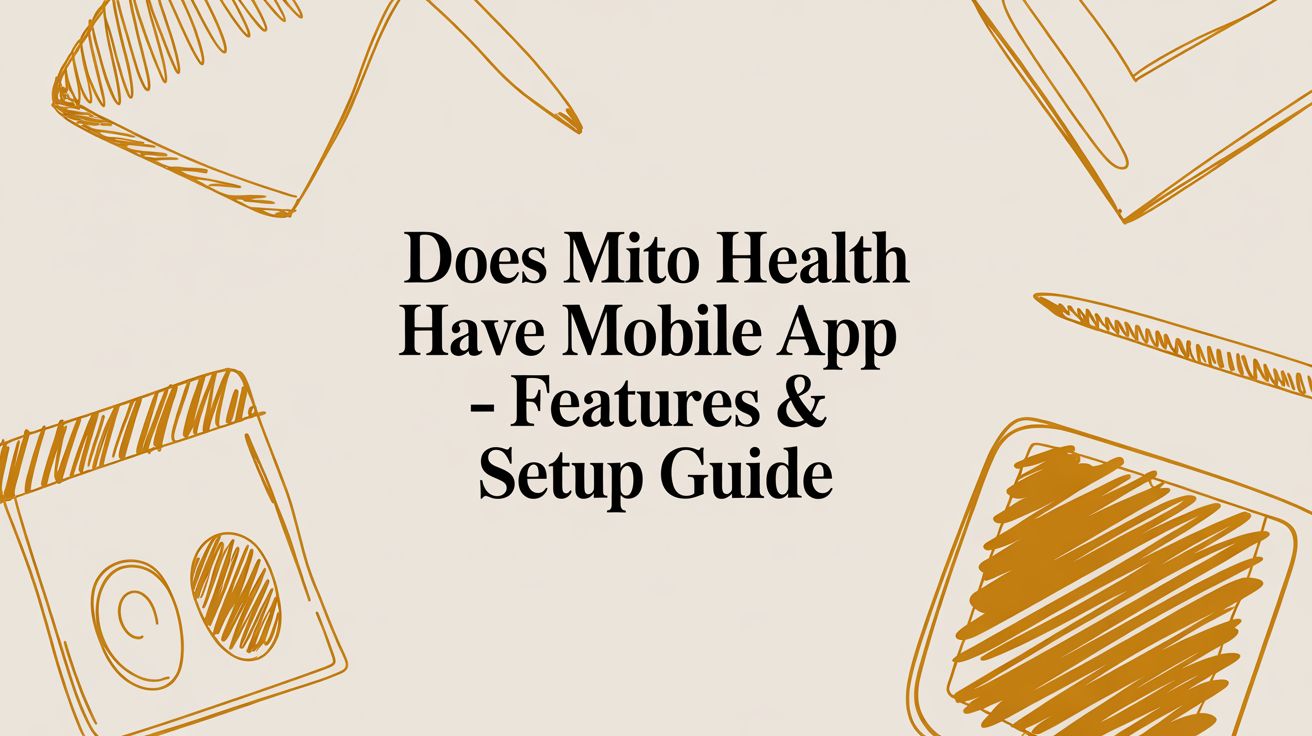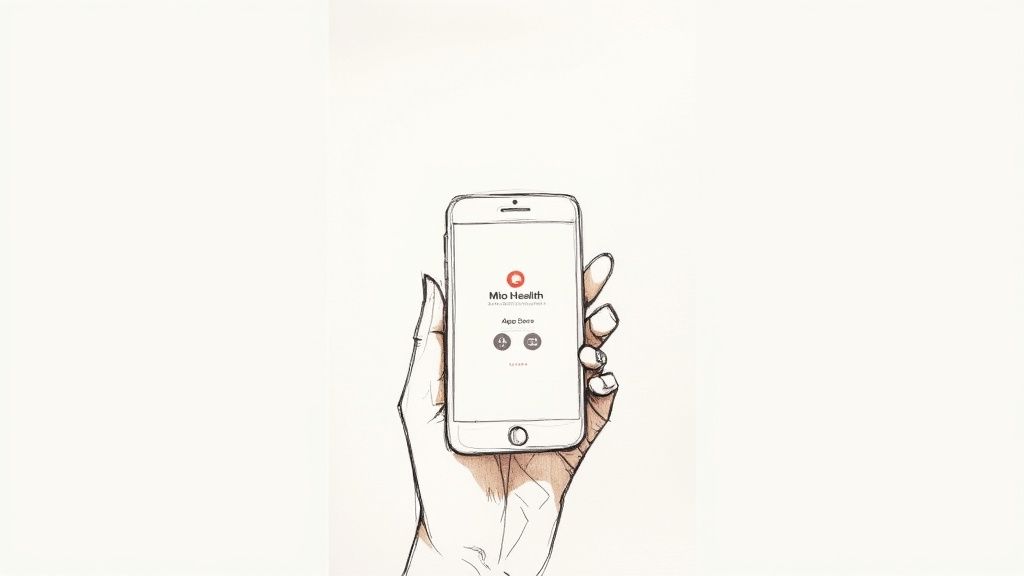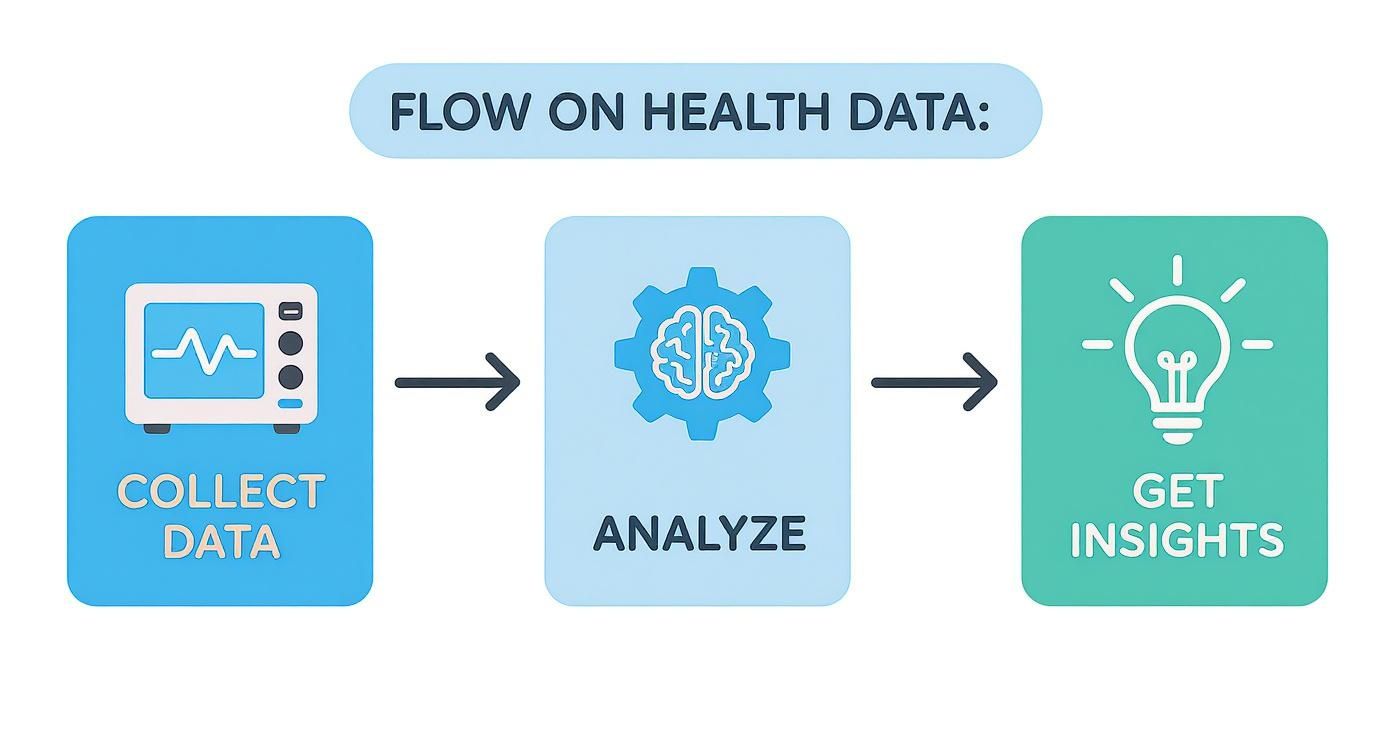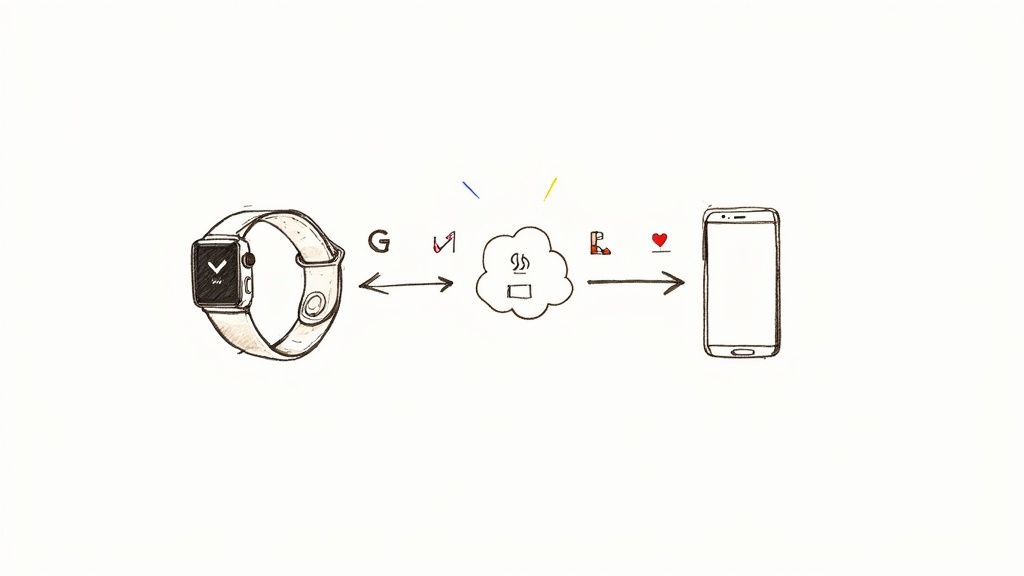does mito health have mobile app - Explore features, setup steps, and how it stacks up against top health and longevity trackers.

So, you're looking into Mito Health and wondering, "Does Mito Health have a mobile app?" The answer is a clear yes.
Mito Health provides a mobile app for both iOS and Android, making it easy to keep tabs on your health data right from your pocket. This guide will walk you through its features, setup process, and how it compares to other health-tracking tools.
Disclaimer: This article is for informational purposes only and is not a substitute for professional medical advice. Always consult with a qualified healthcare provider before making any lifestyle or medication changes.

Think of the Mito Health app as the command center for your personal health journey. It’s built to go beyond simple step counting and instead offers a much deeper look at your body’s unique biological signals, turning that complex data into insights you can actually use.
The best part? It's readily available on the major app stores, so you can jump in and get started without any hassle.
Mito Health isn’t a small player in the mobile health space. The app is available on both the Google Play Store and the Apple App Store, and its reach is pretty impressive.
As of early 2025, the app has been downloaded by over 53,000 users across 14 different countries. It’s not just about downloads, either—user feedback has been overwhelmingly positive, earning it an outstanding 9.3 out of 10 score.
Disclaimer: This article is for informational purposes only and is not a substitute for professional medical advice. Always consult with a qualified healthcare provider before making any changes to your lifestyle, diet, or medication based on information from an app.
To make things even easier, here’s a quick guide with direct download links and compatibility details to get you up and running in no time.
This table breaks down everything you need to download the Mito Health app for your specific device.
Just tap the link for your phone's operating system, and you'll be taken straight to the download page.
Once you get it running, what does the Mito Health app actually do? Think of it less like a simple step counter and more like a personal command center for your health, giving you a much deeper look at how your body is performing.
The app's main job is to keep an eye on crucial biomarkers and then turn that data into personalized "biohacks"—or in plain English, actionable tips. For instance, it tracks things like LDL cholesterol (the ‘bad’ kind) along with other markers tied to your metabolic health and longevity.
The user dashboard is where all the magic happens. It’s designed to take complex health data and make it easy to understand, visualizing your trends over time. This helps you finally connect the dots between your daily habits and your biological results.
One of its strongest features is how it pulls in data from different places. The app’s popularity has grown partly because it plays well with others. By 2025, it could sync up not just with Apple Health, but also with platforms like Ultrahuman and Health Connect. This integration lets the app analyze 67 key biomarkers that are critical to your well-being. You can dig into the more technical specs on the official Mito Health App Store page.
But it's not all just numbers and charts. The app also builds in a sense of community and a few practical safety features. There’s a community support system where you can share your progress and get a motivational boost from others who are on the same path. For a better feel of what this is like, it's worth checking out some firsthand Mito Health user reviews.
On top of that, a handy tool like the SOS function adds a nice layer of security, letting you quickly alert contacts if there's an emergency. It's this mix of deep data analysis, community support, and real-world safety tools that makes the Mito Health app a pretty comprehensive choice for anyone serious about managing their health.
Important Note: While apps like Mito Health offer valuable insights, they are not a replacement for professional medical advice. You should always encourage consulting a healthcare provider before lifestyle or medication changes. This ensures any decisions you make are safe and right for your unique health situation.
Getting the Mito Health app up and running is pretty simple. The whole process is designed to get you from download to personalized insights as quickly as possible, integrating right into your daily routine.
First thing's first: you need to grab the app from your phone's official store. You can find it on the Apple App Store for iOS devices or the Google Play Store for Android. The download is fast, and once it’s installed, the app walks you through the initial setup.
During setup, you’ll create an account and answer some questions about your lifestyle, diet, and what you’re hoping to achieve. This part is really the foundation for all the personalized "biohacks" and recommendations you'll get, so it's worth taking a minute to be as accurate as you can.
Next, the app will ask for permission to connect with other health data sources on your phone. To get the most accurate tracking, you'll want to grant access to platforms like Apple Health or Health Connect. This allows you to sync data from any wearables you use, like a smartwatch or fitness tracker.
This step is a game-changer. It lets the app pull in a rich set of data points—everything from your sleep patterns to your heart rate variability (HRV). As experts at the Cleveland Clinic note, HRV—the variation in time between each heartbeat—is a key indicator of your body's stress and recovery levels, giving the app a much deeper understanding of your well-being.
This graphic gives you a good visual of how the app turns your data into something you can actually use.

It’s a straightforward flow: the app collects raw data from your inputs and wearables, crunches the numbers with its algorithms, and then serves up personalized health advice.
In short, syncing your wearables allows the app to combine activity, sleep, and stress data to provide more holistic and accurate health recommendations.
Important Disclaimer: This article is for informational purposes only. The data and suggestions provided by the Mito Health app are not a substitute for professional medical advice. Always consult with a healthcare provider before making significant changes to your lifestyle or health regimen.

The real power behind any health platform, Mito Health included, is its ability to bring all your data together in one place. Instead of having your sleep stats on one device, activity on another, and heart rate somewhere else entirely, a good app pulls it all together.
This integration is what transforms a stream of raw numbers into advice you can actually use.
Think about it: what if your wearable tracks a terrible night's sleep, but your health app has no idea? Any recommendations it gives you for boosting energy or focus that day will be completely missing the point.
By linking up devices like your Apple Watch or an Ultrahuman Ring, the Mito Health platform can start connecting the dots. It might see that your resting heart rate spikes on days after poor sleep, which could trigger a suggestion for light activity or a mindfulness exercise. This approach aligns with guidance from organizations like the American Heart Association, which supports the use of digital tools for monitoring health metrics.
This is the foundation of truly personalized health guidance.
Mito Health plays nicely with the major health data hubs, which means it’s compatible with most popular wearables right out of the box. This is a huge plus, saving you from the headache of manually plugging in your data.
Key integrations include:
When you're sizing up different health services, this ability to connect your existing tech is a huge deal. For example, in a deep dive comparing various platforms, you'll often see the discussion circle back to how each platform uses this synced data to generate its recommendations.
A Note on Data Privacy: Handing over access to your health data is a big deal, and it requires trust. Mito Health details its approach to data security in its privacy policy. Before you sync anything, it's always a smart move to review how an app stores and uses your information. This way, you stay in the driver's seat when it comes to your sensitive health details.
While Mito Health gives you a solid foundation for tracking longevity markers, the world of health apps is packed with specialized tools. The best app for you really hinges on what you’re trying to accomplish—whether that’s managing your heart health, dialing in your nutrition, or hitting new fitness goals.
It's a crowded space, but that's a good thing. According to the U.S. Centers for Disease Control and Prevention (CDC), lifestyle modifications are key to preventing chronic diseases. Digital health tools empower people to take a more active role in their own well-being. The trick is to find an app that syncs up with your personal goals and gives you guidance that’s actually clear and actionable.
If your focus is squarely on cardiovascular wellness, a specialized app is almost always going to give you deeper and more useful insights than a general-purpose one. Longevity apps are fantastic for a bird's-eye view, but they often lack the targeted features you need to move the needle on heart-specific metrics.
This is exactly where an app like HeartFit (heartfit.ai) comes into its own. It’s built from the ground up to translate complex bloodwork data into a simple, sustainable habit-building system laser-focused on heart health.
By turning a health action plan into daily, gamified tasks, HeartFit makes it easier to build and maintain the small, consistent habits that contribute to long-term cardiovascular well-being. This targeted approach is ideal for anyone looking to actively improve their heart health metrics.
To help you sort through the options, let's put a few of the top contenders side-by-side. Each app has its own strengths, is built for a different type of user, and offers a unique set of core features. Getting a handle on these differences is the first real step toward picking the right tool for your health stack.
For a more comprehensive look, you can dive into this guide on the best health tracking apps available today.
The table below breaks down how these platforms stack up, focusing on what they do best, who they’re for, and what makes them tick.
This table offers a comparative look at leading health apps, focusing on their primary features, target audience, and data integration capabilities.
In the end, while the question "does Mito Health have a mobile app?" has a straightforward answer, the more important question is whether it's the right app for you. By evaluating alternatives like HeartFit, you can find a tool that doesn’t just track your data but actively supports your most important health priorities.
Disclaimer: This article is for informational purposes only and is not a substitute for professional medical advice. Always consult with a healthcare provider before making any lifestyle or medication changes.
Thinking about diving into Mito Health? It's natural to have a few questions before you commit. Let's walk through some of the most common things people ask about the app's features, cost, and how it handles your data.
Not exactly. Mito Health runs on a subscription model. You can download the app itself for free to get a feel for the interface, but to unlock the features that really matter—like tracking your biomarkers and getting personalized health insights—you'll need a paid membership.
Think of the subscription fee as covering the comprehensive analysis of your health data and the ongoing support you get from the platform. Upgrading is what gives you the full toolkit to monitor and improve your health for the long haul.
This is where Mito Health really shines. It's designed to be a central hub for your health, going way beyond just counting your steps. The goal is to build a complete, detailed picture of your well-being.
Here’s a look at what it typically keeps tabs on:
Handing over sensitive health information means you need to trust the platform. Data privacy is a significant concern, and rightly so. Mito Health lays out its security protocols and data-handling practices in its official privacy policy, which you can find on their website or within the app. They use security measures to safeguard your personal health information.
According to the American Heart Association, a normal resting heart rate for most adults is between 60 and 100 beats per minute (bpm). However, this can vary based on factors like age, fitness level, and medications. Highly active individuals may have a resting heart rate closer to 40 bpm.
A Quick but Important Reminder: While an app like Mito Health is a powerful tool for guidance and motivation, it is not a replacement for professional medical care. You should always consult with a qualified doctor before making any significant changes to your diet, exercise plan, or medications. Your doctor is the only one who can give you advice based on your full medical history.
Ready to build sustainable heart-healthy habits with a system designed to motivate you every day? Heart Fit turns your health plan into a fun, gamified experience with AI-powered meal scoring and personalized coaching. Start your journey with a 7-day free trial at https://www.heartfit.ai.